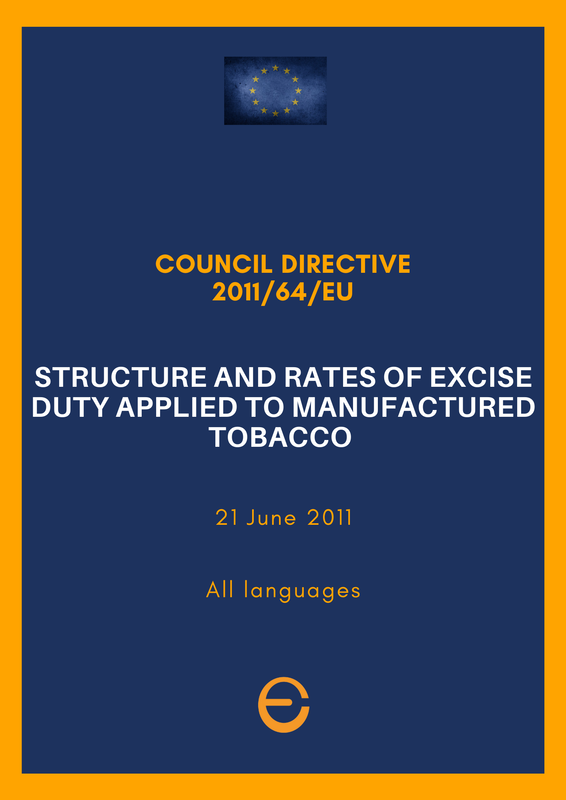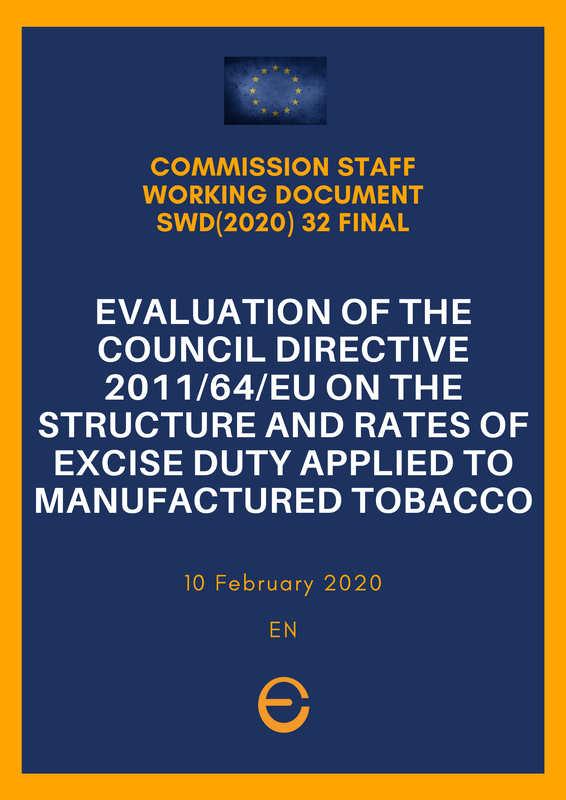|
Last updates: |
|
Tax measures and activities against
illicit trade
The European strategy to constantly reduce the use of tobacco or tobacco products provides for the upward harmonization of taxes on those products in all EU countries and the fight against illicit trafficking in tobacco and its products, through a product tracking system, from manufacturing to distribution.
Structure and rates of excise duty applied in the EU on manufactured tobacco
|
EU legislation on excise duties for manufactured tobacco defines:
Manufactured tobacco is also subject to the common provisions for excisable goods under EU law. Go to the Commission page. 1. Cigarettes Directive 2011/64/EU, as amended over time, requires Member States to levy a minimum rate of excise duties on cigarettes. This minimum rate must consist of:
In addition, the overall excise rate is:
Member States that apply excise duty of EUR 115 or more, however, do not need to comply with the 60% criterion above. Calculation for pack of 20 cigarettes Retail Selling Price (excluding taxes): € 0.7 + Excise duty - specific: € 1.0 + Excise duty - ad valorem: € 0.8 (27% of RSP) Total excise duty: EUR 1.8 (60% of RSP) = Price (excluding VAT): €2.5 + VAT 20%: € 0.5 = Retail Selling Price (including all taxes): € 3.0 |
As EU legislation only sets harmonised minimum rates, Member States are free to apply excise duty rates above these minima, according to their own national needs.
Specific provisions exist to allow Portugal to apply a reduced rate up to 50% less than the required overall minimum excise duty on cigarettes consumed in the most remote regions of the Azores and Madeira.
2. Other tobacco products
Directive 2011/64/EU also sets down minimum excise duty rates for manufactured tobacco other than cigarettes and the taxing structure is different than for cigarettes.
Member States can apply a specific component or an ad valorem component, or a mixture of two.
Minimum Rates (2021)
Specific provisions exist to allow Portugal to apply a reduced rate up to 50% less than the required overall minimum excise duty on cigarettes consumed in the most remote regions of the Azores and Madeira.
2. Other tobacco products
Directive 2011/64/EU also sets down minimum excise duty rates for manufactured tobacco other than cigarettes and the taxing structure is different than for cigarettes.
Member States can apply a specific component or an ad valorem component, or a mixture of two.
Minimum Rates (2021)
- Fine-cut smoking tobacco: 50% of the weighted average retail selling price or € 60 per kilogram
- Cigars and Cigarillos: 5% of the retail selling price or € 12 per 1000 or per kilogram
- Other smoking tobaccos: 20% of the retail selling price or EUR 22 per kilogram.
Revision of excise rules for Tobacco (as July 2021): the Roadmap
|
In 2020 the European Commission launched a procedure for the revision of Directive 2011/64/EU. 1. Evaluation of current Directive, in 2020 The first step was an evaluation of the results provided by the directive. The evaluation showed that the imposition of a common and high level of excise duty gave stability to the tax revenues of EU countries, but only affected the reduction of smokers in countries where the level of excise duty was low compared to the European average. . For this reason, in line with public health objectives and given that 26% of the population still smokes (29% among young people), the European Commission believes that the level of minimum excise duties should be raised again. Furthermore, given that the price per package today ranges from €2.57 to €11.37, this represents a sufficient economic incentive for high and unanticipated levels of cross-border shopping. The evaluation also highlights that the emergence of new products, such as e-cigarettes, heated tobacco products and new addictive products reveal the limitations of the current legal framework. |
The evaluation concludes that a more comprehensive approach is needed, taking into account all aspects of tobacco control, including public health, taxation, the fight against illicit trade and environmental concerns.
2. Inception impact assessment, 2020/2021
As second step, from 8 December 2020 and 5 January 2021 the European Commission launched an Inception impact assessment. You can ask us to receive the full feedback received with 134 contributions. Inception impact assessment - Ares(2020)7441440
3. Public consultation ("Have Your Say"), 2021
As third step, from 30 March 2021 and 22 June 2021, the European Commission opened a Public Consultation on the revision of the Directive. You can ask us to receive the full feedback received. Feedback
4. Revision of the Directive
The Commission should adopt a proposal for revision during the fourth quarter 2021.
2. Inception impact assessment, 2020/2021
As second step, from 8 December 2020 and 5 January 2021 the European Commission launched an Inception impact assessment. You can ask us to receive the full feedback received with 134 contributions. Inception impact assessment - Ares(2020)7441440
3. Public consultation ("Have Your Say"), 2021
As third step, from 30 March 2021 and 22 June 2021, the European Commission opened a Public Consultation on the revision of the Directive. You can ask us to receive the full feedback received. Feedback
4. Revision of the Directive
The Commission should adopt a proposal for revision during the fourth quarter 2021.
Tackling illicit trade
1. There is an International Protocol issued by the World Health Organisation (WHO) to "Eliminate Illicit Trade Tobacco Product It is an international treaty with the objective of eliminating all forms of illicit trade in tobacco products through a package of measures to be taken by countries acting in cooperation with each other: it is a global solution to a global problem.The Protocol was developed in response to the growing illicit trade in tobacco products, often across borders. Illicit trade poses a serious threat to public health because it increases access to – often cheaper – tobacco products, thus fueling the tobacco epidemic and undermining tobacco control policies. It also causes substantial losses in government revenues, and at the same time contributes to the funding of international criminal activities. Go to WHO web page.
2. The European Anti-Fraud Office (OLAF) investigates illegal tobacco trading in line with the International Protocol on illicit trade in tobacco products, issued by World Health Organisation.
3. Articles 15 and 16 of the Tobacco Products Directive 2014/40/EU (TPD) provide for EU-wide systems of traceability and security features for tobacco products to address the issue of illicit trade. The systems became operational on 20 May 2019.
The traceability system aims to:
2. The European Anti-Fraud Office (OLAF) investigates illegal tobacco trading in line with the International Protocol on illicit trade in tobacco products, issued by World Health Organisation.
3. Articles 15 and 16 of the Tobacco Products Directive 2014/40/EU (TPD) provide for EU-wide systems of traceability and security features for tobacco products to address the issue of illicit trade. The systems became operational on 20 May 2019.
The traceability system aims to:
- Contribute to reducing the circulation of non-compliant tobacco products
- Reduce artificially cheap supplies of illegal tobacco products
- Protect public health, State budgets, and legal economic operators.
- All unit packets of tobacco products will be required to be marked with a unique identifier
- Relevant economic operators involved in tobacco trade will be required to record the movements of these packets throughout the supply chain and transmit the related information to an independent provider (data storage contracts to be approved by the Commission)
- The data will then be made accessible to the authorities of EU countries and to the Commission for enforcement purposes.
TIPS: If you want to be constantly informed on the ongoing legislative process in the European Institutions on Tobacco products and to take part to the debate, fill the form below.




